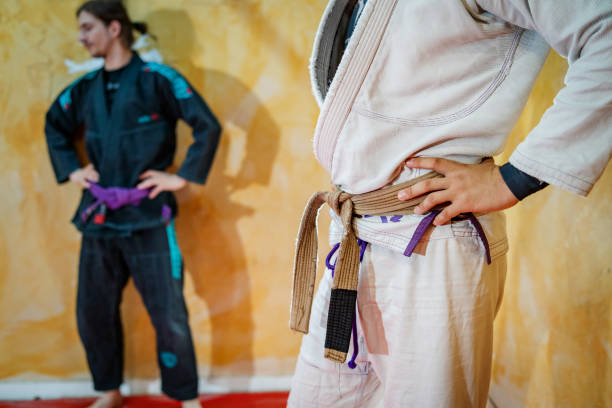The idea of taking up wrestling can be quite daunting. The sport surely demands substantial physical strength, stamina, and dedication. It’s unfortunate that wrestling often doesn’t get the acknowledgement it warrants, resulting in a dearth of comprehension about its nuances. If the thought of training in wrestling has crossed your mind, it’s advisable to acquaint yourself with its fundamental principles beforehand.
The Basics

Before the beginning of each match, opponents stand in their respective corners. After the referee gives the signal that the match can start, the wrestlers start competing for three two-minute periods. In-between these three two-minute periods is a 30-second rest period, which both opponents spend in their corners and listen to advise from their coach. Once the match has started, there are no time-outs. Only the referee or the clock can stop the match.
Keep in mind that sometimes the length of the match will vary depending on the level of competition. For example, youth wrestlers will most likely participate in a match consisting of three one-minute periods. On the other hand, high school wrestlers will compete for a full six minutes. When it comes to college wrestling, the first period is three minutes long, while the other two are two minutes each.
The Objective
In wrestling, there are two possibilities when it comes to ending a match. The first is that you manage to pin your opponent. In other words, you’ll need to press his or her back or shoulder blades to the mat. In order for the match to be over, you’ll have to press them for a minimum of two seconds. In case you don’t manage to do this throughout the match, you can still win by outscoring your opponent.
How to Score Points

There are several different ways a wrestler can score points during a match:
- A wrestler is able to score one point if he manages to escape from the opponent and goes from a bottom to a neutral position.
- Wrestlers can score two points if they manage to gain control over their opponents. Points are only awarded if both of the wrestlers were in a neutral position before one of them got his or her opponent to the mat and gained control of his or her hips.
- A reversal can get you two points. Basically, you get two points if you manage to gain control of your opponent from the bottom position without going to neutral first. Reversals can happen when you’re standing or lying on the mat.
- The fourth way to score points is to have control of your opponent in a near pinning position. Once your opponent’s shoulders are within four inches of the mat, the referee will start counting. After two seconds pass, you will get two points. However, if the referee counts for five seconds, the wrestler will get three points.
Overtime
Of course, a match can be tied after three two-minute time periods. In this case, there is a one-minute overtime period. During overtime, both wrestlers start from a neutral position. If the match is still tied after this time period, another 30 seconds are added. However, before these 30 seconds start, the referee flips a coin to see who will get the choice of position. Wrestlers are able to choose between up and down.
If a wrestler chooses the top position, he or she must not let the opponent score any points. In case the wrestler on the bottom scores any points, he or she is declared the winner. On the other hand, if the wrestler on the top prevents the bottom from scoring any points, he or she becomes the winner.
Penalties
Just like any other popular sport, wrestling has penalties for participants who don’t follow the rules. There are several different situations that can happen during a match that lead to penalties. For example, if a wrestler does an illegal hold during a match, he or she gets a one-point deduction.
Here are some of the other penalties in wrestling:
- Technical violations also carry point deductions. Some of the technical violations that can happen during a wrestling match include stalling, grabbing the opponent’s headgear or clothing, and going off the mat.
- Unnecessary roughness is another form of penalty that is defined as any act that can be hazardous to the well-being of the opponent.
- Any type of misconduct that you do that is deemed flagrant will cost your team three points, while you will face automatic ejection.
- Wrestlers face penalties for unsportsmanlike conduct as well. This can happen either during or after the match. In case it happens during the match, the wrestler will most likely lose one point and will be warned. However, if it happens after the match, the wrestler’s team will lose a point.
How to Prepare for Wrestling

If you’re serious about getting into wrestling, you should know that this sport can be both physically and mentally demanding. Therefore, you should take all the necessary steps to prepare yourself for it. First of all, you should get a lot of rest in order to stay focused while you’re on the mat.
You should also work on your endurance since you will need it in wrestling matches. Know that you’ll need to be able to run at moderate intensity for at least 40 minutes before you start competing. Apart from that, it’s important that you work on your strength as well. Some of the best exercises that you can do in order to improve your strength include arm curls, pull-ups, leg curls, bench presses, and upright rows.
It’s also recommended that you start eating healthier. Consuming the right nutrients will help you stay prepared for any challenges you face during training or wrestling matches. It’s a good idea to research how you should eat both before and after a training session.
You should also ensure you have the right gear for both comfort and protection. Many people opt to wear wrestling headgear to protect their heads and ears. And you may also want to invest in some good quality wrestling shoes to help with comfort and performance as well as protect your feet during this physical sport.
Disease Prevention
Keep in mind that you can encounter some health problems in this sport. Because of this, you should check your skin every single day for changes in texture, swelling, and discoloration. Wash your practice gear every day and never share it with someone else. It’s also recommended that you scrub your body with antibacterial soap every day.





